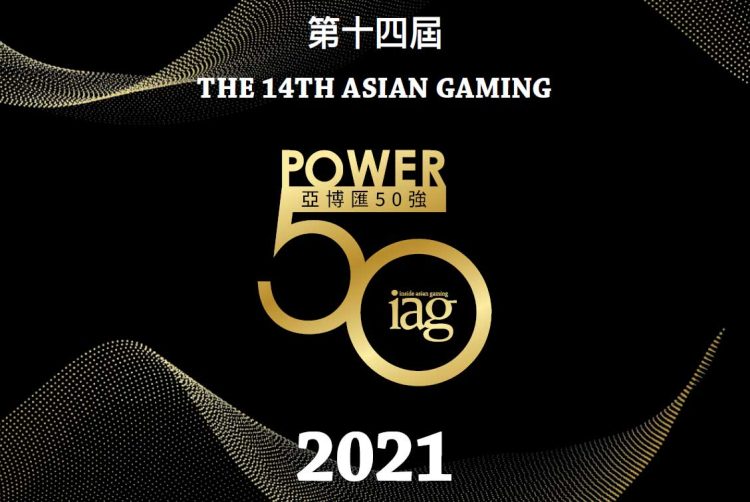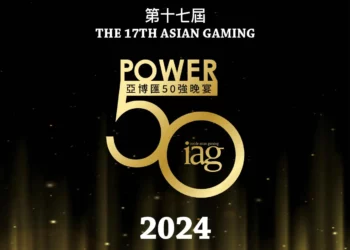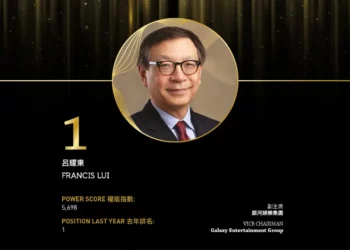When the Asian Gaming Power 50 was first published in 2008, we could never have imagined that, some 13 years later, it would have developed into one of the most anticipated releases on the annual calendar.
 What began as a fun and innovative look at those who make our industry tick has evolved into an important annual insight anxiously awaited by all. Compiling the Asian Gaming Power 50 is an intriguing, demanding, educational and exhausting task yet one that comes with considerable responsibility to “get it right.”
What began as a fun and innovative look at those who make our industry tick has evolved into an important annual insight anxiously awaited by all. Compiling the Asian Gaming Power 50 is an intriguing, demanding, educational and exhausting task yet one that comes with considerable responsibility to “get it right.”
That’s a difficult challenge at the best of times but one made even more difficult given the enormous turmoil our industry has suffered since the COVID-19 pandemic first emerged almost two years ago.
This is also the first year since its inception that the Asian Gaming Power 50 will be without Sheldon Adelson, who passed away in January after a battle with cancer. The Las Vegas Sands founder, who played such an enormous role in shaping modern-day Las Vegas and Macau (and Singapore for that matter), debuted at No.2 in 2008 – behind only Dr Stanley Ho – and claimed the No.1 spot on seven separate occasions including six years in a row between 2013 and 2018.
But as one generation passes a new one emerges, and it is with this in mind that the selection panel crafted the 2021 Asian Gaming Power 50. We hope you enjoy!
DEVELOPMENT
The birth of the Asian Gaming Power 50 in 2008 coincided with an evolution in the region’s land-based casino industry, coming 12 months after The Venetian Macao opened its doors in 2007.
Since then, a small parcel of land measuring just 6.7 square kilometres has become the richest place on earth, home to world-class integrated resorts City of Dreams, Galaxy Macau, Grand Lisboa Palace, MGM Cotai, Studio City, The Londoner Macao, The Parisian Macao and Wynn Palace.
This hugely successful Asian integrated resort model has since spread like wildfire across the region. In recent years the Philippines has been Asia’s fastest growing market, with its four IRs – Solaire Resort & Casino, Okada Manila, City of Dreams Manila and Resorts World Manila – making it a clear No.2 on the Asian gaming scene.

 In Singapore, Resorts World Sentosa and Marina Bay Sands are now world-renowned landmarks. Paradise City and Jeju Shinhwa World have introduced the integrated resort concept to Korea, which grew by one with the launch of Jeju Dream Tower last December and will see another two to open in Incheon over the next few years.
In Singapore, Resorts World Sentosa and Marina Bay Sands are now world-renowned landmarks. Paradise City and Jeju Shinhwa World have introduced the integrated resort concept to Korea, which grew by one with the launch of Jeju Dream Tower last December and will see another two to open in Incheon over the next few years.
Meanwhile, Vietnam is home to the nation’s first casino at which locals are permitted to gamble, in Corona Resort & Casino, as well as The Grand Ho Tram Strip and Suncity’s Hoiana, the latter welcoming its first guests in mid-2020.
And let’s not forget NagaWorld in Cambodia, which broke ground on its massive US$3.5 billion Naga3 expansion project.
Despite such incredible development, only four people have sat atop the Asian Gaming Power 50 over the past 13 years. They are:
- 2008: Dr Stanley Ho
- 2009: Tan Sri KT Lim
- 2010: Mr Sheldon Adelson
- 2011 and 2012: Mr Francis Lui
- 2013 to 2018: Mr Sheldon Adelson
- 2019 and 2020: Mr Francis Lui
- 2021: read on to find out!
The 2021 Asian Gaming Power 50 has seen plenty of movement with the passing of Mr Adelson and the economic impact of COVID-19 shifting the powerbase across much of the region.
Some of the biggest stories of the year, COVID aside, have included Macau’s path towards relicensing, Japan’s protracted struggle to realize a casino gaming industry, and Australia’s Crown Resorts having its Sydney casino license suspended and facing inquiries into its suitability in Melbourne and Perth.
PAST NUMBER 1s
 DYNAMIC
DYNAMIC
The Power 50 list is not a place for people to rest on their laurels. While there are some points awarded for company longevity and/or executive tenure, the list predominantly focuses on the activities of the prior 12 months. It’s all about “what are you doing now?” and “what have you done lately?” not “what have you done in the last 15 years?” As such the Power 50 list is very dynamic as people move up, and down, and on, for a multitude of reasons.
A phenomenon that repeatedly presents during the making of the list each year is the “My business has grown therefore I should move up the list” fallacy. The truth is everyone lifts in a rising tide. As a general rule, the majority of people on the list are managing businesses that grow each year, and just to maintain a spot on the list requires annual growth. Someone doing the same thing year after year and achieving similar results will slowly slip down the list as the years roll by.

DILEMMAS
Although we have become quite adept at putting this list together, the task seems to get more complex each year as the Asian gaming industry matures and becomes more nuanced. How on earth does one compare the sole owner of a smaller property to the brand new “hired help” COO of a much larger one? How about comparing a large property that is still in pre-opening to a smaller one that has been active for years? A junket operator in Macau versus the CEO of the Hong Kong Jockey Club? Or the head of a smallish casino company about to go public to the President of a casino chain in Korea that doesn’t have locals gaming? These are the types of tough questions the selection panel of the Asian Gaming Power 50 wrestles with.
As with any such ranked list, there are always criticisms and objections, usually from those who feel slighted. We often hear claims of not reading the list or not caring about it, but we are often sent messages, either directly or through surrogates, bemoaning the injustice of a perceived lowly position and lobbying for the following year. Strangely, no one has ever contacted us to complain about being ranked too high!

DECISIONS
We are pleased to welcome eight esteemed members to the Asian Gaming Power 50 judging panel this year, including a new addition in former MGM China CEO Grant Bowie. We thank them for their valuable advice and insights throughout the long process of finalizing our list. You’ll have a chance to meet all eight judges in the coming pages. Over the last decade the Asian Gaming Power 50 has become the definitive list of the industry’s most important people, and as such we play a vital role in the industry and have a responsibility to simply get it right. Keen followers of the list will remember that in 2016 we completely overhauled the Power 50 ranking methodology, and in an effort to be more scientific and objective in the rankings we introduced a numerical “Power Score” for each person on the list. This proved popular and we’ve continued this tradition through to today.

Power Score points arise from a number of factors including the GGR of the person’s organization (or a surrogate comparative measure if necessary), a weighted “carving up” of those points between the top senior executives with key policy control of that organization, adjustments for whether the person is hired or has a major equity position, their length of tenure, how active in business initiatives the person has been in the prior 12 months, the long-term gaming pedigree of the person, the jurisdiction in which he or she operates and many more. Some factors are necessarily subjective, but we’ve always assigned a points value in an attempt to be objective.

We have done this without any predetermined idea of where any person should or should not be ranked.
At the end of the day, in our industry the concept of “power” generally comes down to direct or indirect control of money. The greater the GGR controlled, the greater the power. But what, exactly, is control? It’s about influence, it’s about who is the ultimate decision maker, and sometimes it’s simply about who is the person everyone in the room looks to for the answers. In the same way that a country is a country because other countries say it is, some people are powerful simply because other people say they are.
Finally, I’d like to take this opportunity to thank my fellow selection panel members for their tireless work and excellent insights. And so, without any further ado, we present the 14th edition of the Asian Gaming Power 50. Enjoy!































